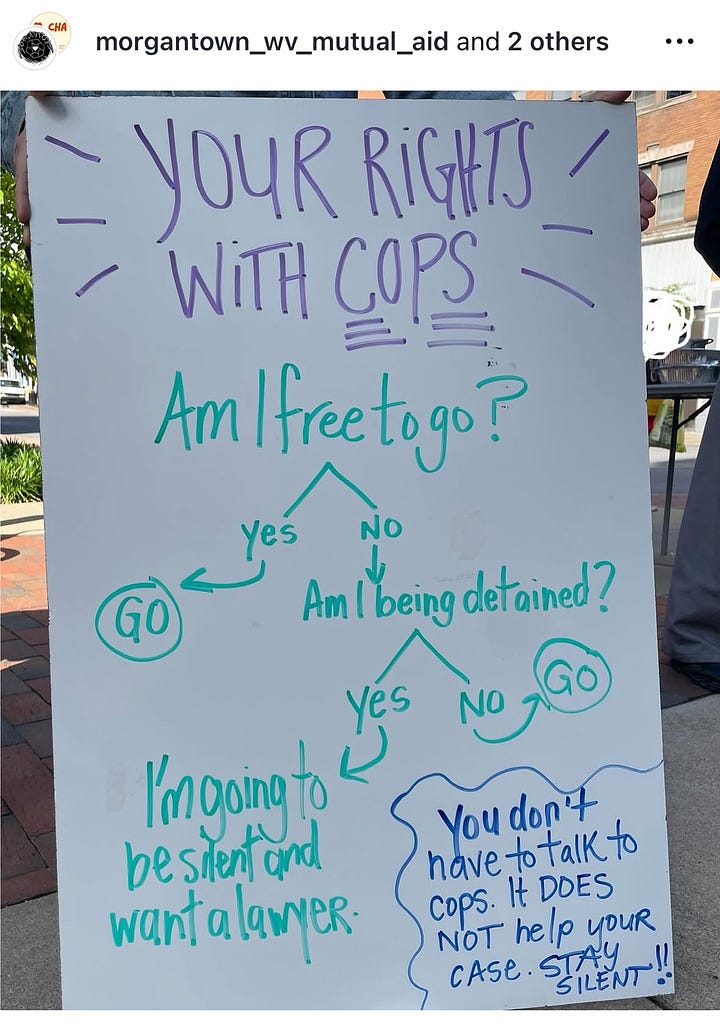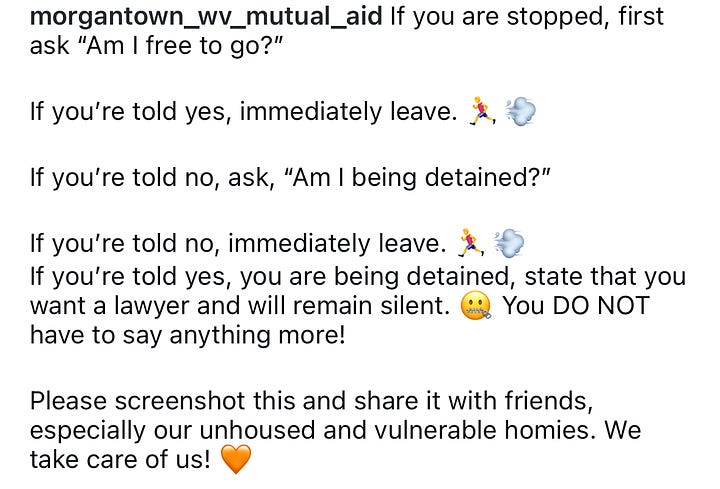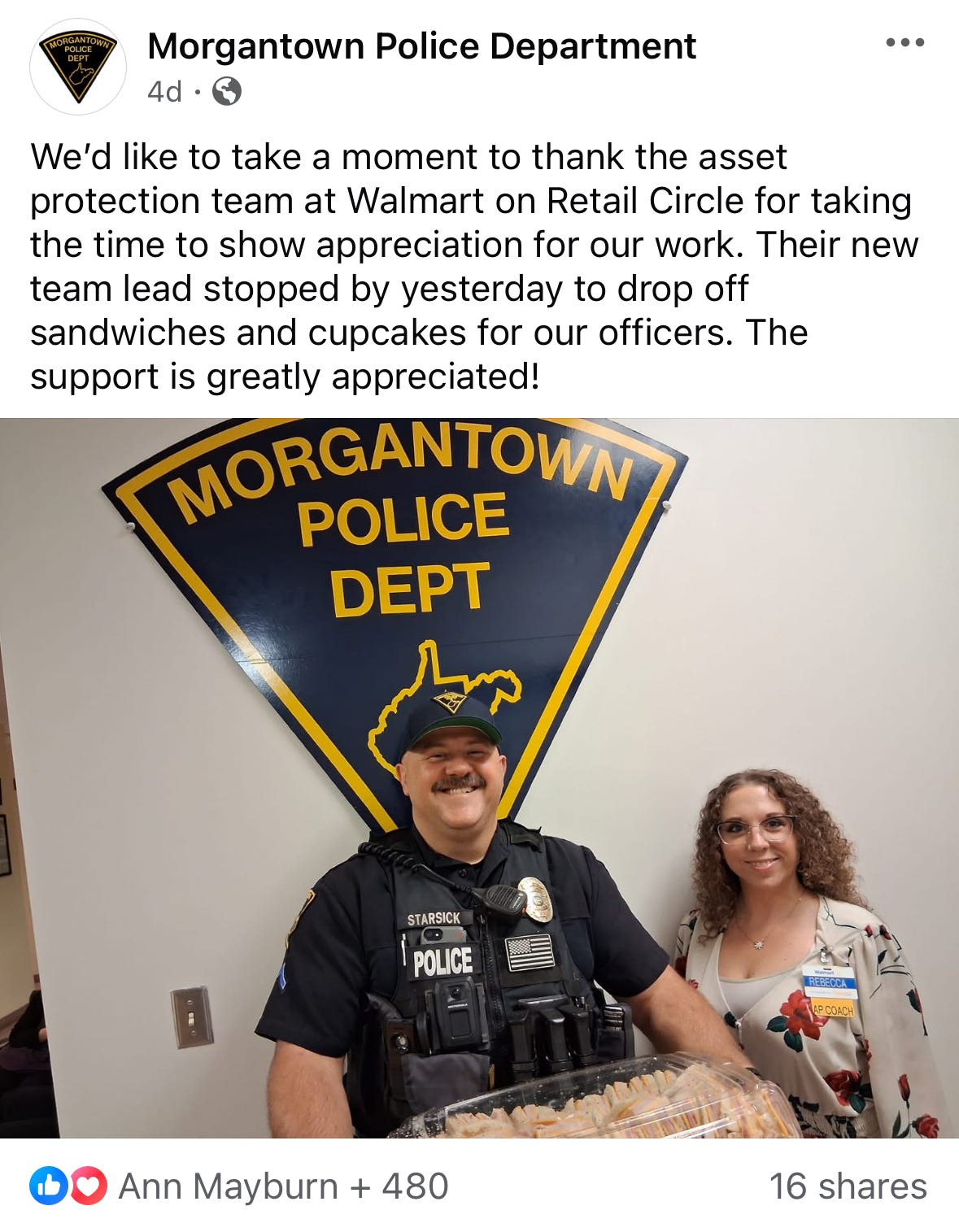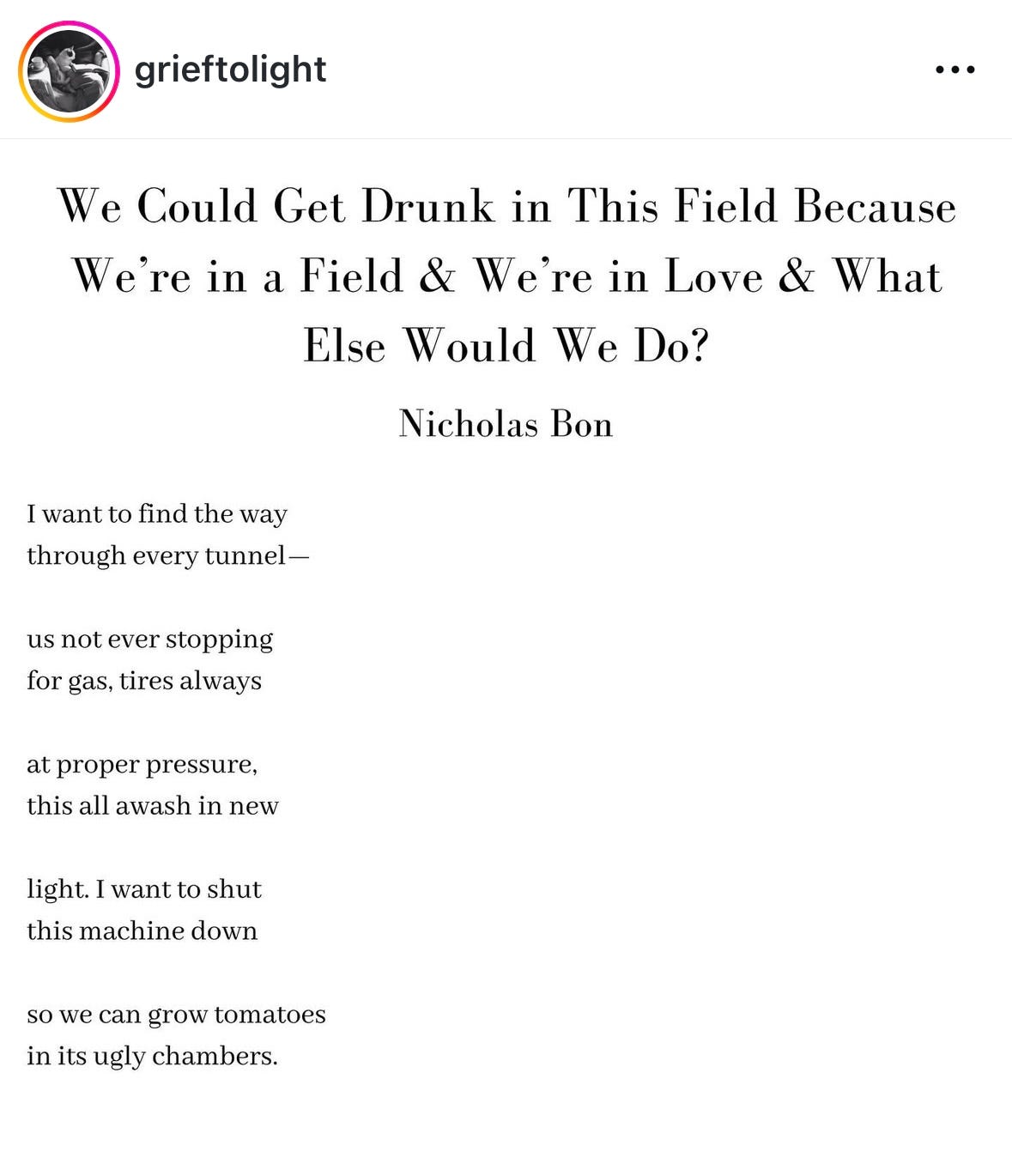Hear y’all! Lindsey back with you after a 13-hour drive back home from Door County, aka “Cherryland,” Wisconsin for a brief respite from, well, *gestures at everything*. We camped, we biked, we knocked another national park off our list (Indiana Dunes for the curious), and thoroughly enjoyed Lake Michigan and her many bayside towns. I pride myself on curating (yea, I said it) really sweet, memorable trips; happy to share any details if I’ve influenced you to the upper realms of Green Bay land.
Alas, now we’re back, on the eve of the camping ban going into effect no less. To that end, let’s jump in.
On Our Minds
Law enforcement. Who it really protects, who it’s weaponized against, why we rely upon it as a solution to social problems.
These questions are prescient because the City’s camping ban goes into effect this Wednesday, June 4th, and our neighbors who sleep outside are going to start getting hassled and arrested by cops because there is nowhere else for them to sleep (ICYMI: Grace Shelter lost a lot of shelter bed capacity and are regularly turning people away). Their environment will grow increasingly hostile on top of already getting bogus tickets like “disorderly conduct” or “crossing without a crosswalk” for exercising constitutionally protected speech.
As such, it’s a good time for some basic reminders about your and others’ rights when it comes to interacting with cops:
If a cop stops you, ask “Am I free to go?” If they say no, ask “Am I being detained?” If they say yes, say “I’m invoking my constitutional right to remain silent and I’m not saying another word until I speak with an attorney.” That’s it. SHUT. UP. It never pays to try and explain yourself to cops. Allow me to repeat myself: don’t talk to cops.
In West Virginia, you don’t have to give a cop your name or identifying information unless you’re being detained. If a cop stops you and asks for ID, ask the questions above. If you aren’t being detained, you don’t have to ID yourself.
If cops (ICE, whatever government
thugagent) are hassling a friend or someone on the street, you are free to record that interaction with your phone or camera. If the police ask if you are recording, say yes (don’t lie).If you are sleeping outside and a cop tries to ticket you, they are required to offer you alternative sleeping arrangements (shelter) for the night in lieu of a ticket. If you are willing to take their offer, they are not allowed to ticket or arrest you.
A cop or other government official cannot just throw away your personal belongings of value (sleeping bag, tent, ID, important documents, etc.) without posting a form of notice if you have been sleeping in a location for more than a few days. Keep track of how long you sleep in any given spot. Tell a trusted friend or write it down. If they toss your belongings without notice, let the folks at Mountain State Justice (304-344-3144) know.
You can hold cops accountable in a couple of accessible ways. Freedom of Information Act requests are always an option. You can get body camera footage that way; I can tell you from experience that you’ll often be horrified by what you see. Second, you can start attending the City’s Civilian Police Review and Advisory Board on which the Scout’s own Catherine sits. I’m sure she’d be happy to answer any questions you have about the Board in the comments.


More broadly, many a book1 has been written on this important and increasingly urgent topic. I don’t purport to be a scholar: what I know about the intersection of policing, violence, and individual and communal rights I’ve gleaned largely through my career as a poverty lawyer and grassroots organizer helping the most oppressed and marginalized neighbors in our community assert their rights.
For a quick and dirty history of how we got modern day police, I recommend this 2020 Jill Lepore piece from the New Yorker, wherein she astutely observes that “[t]he crisis in policing is the culmination of a thousand other failures—failures of education, social services, public health, gun regulation, criminal justice, and economic development.” As her piece details, policing has deep roots in—surprise!—slavery: as enslaved people were legally (reprehensibly) personal property, law enforcement (“slave patrols”) were engaged to run down and return said personal property.
I think this bit of history is crucial for understanding modern law enforcement’s primary role, which is to serve as protector of personal capital. You see this locally with the camping ban, right? We ultimately arrived at this point because a small number of downtown business owners allied with local power brokers (aka rich people, many of whom have ties with the big social service nonprofits) wouldn’t shut up about how seeing poor people was “hurting business.” With the help of a few cronies and pro-police politicians on council, they won an ordinance that now empowers police to throw people in jail specifically for being so poor that they have nowhere indoors to sleep.
It’s important to note that the data bear out that police aren’t actually very good at solving crimes,2 that increased police budgets don’t automatically equate to safer communities, and the cops aren’t always great actors.3 Your local police are more likely to cooperate with Walmart to prosecute you for shoplifting than they are to help solve your rape.4
I know what you’re thinking: Lindsey, you just hate the police. Yea, I do not like them. I think the profession is appealing by nature to bullies who step into a position of near unfettered power that creates conditions that are not only dangerous for my vulnerable friends but also you and me. I have grave concerns about the increased militarization of police forces5 and the ways in which American society uses policing and incarceration to deal with complex social issues, namely poverty. I firmly believe that most people sitting in jail and prison—irrespective of their “crime”—are there because they are poor.6 I believe all of this based on nearly 15 years of professional and personal experience and also because of the heaps of data and reports and information publicly available that backs me up.
As a city, Morgantown has budgeted to spend 22.5% of its $46 million budget ($10.5 million) on its police force in 2025. I like to put that in perspective by comparing it against the $966,000 for our library system, $356,000 for public transportation, $582,031 for city planning, and $35,000 to the Morgantown Housing Authority (and don’t forget the city bailed out a private business to purchase a private gun range for the cops, too, at a cost of millions to taxpayers).
Look, I don’t know what you’d prefer to see your city spend tax dollars on. For me, it’s housing, infrastructure, social services (not housed within the police department), and recreation and third spaces. I recognize we aren’t abolishing the police in Morgantown anytime soon, but here’s some exploratory math: the MPD has been down +/- 20 officers since I’ve lived here. The Chief of Police has testified before council that crime in the city is largely flat, so—I’m extrapolating here—the current number of officers seem to, at minimum, have a handle on things.7
Based on publicly available information about a certified officer’s pay, their annual salary is somewhere in the neighborhood of $55,000. $55k x 20 = $1.1 million (likely an underestimate because I’m not including bonuses or raises). What could we do with $1.1 million bucks annually if we reallocated that money?
Food for thought.
For friends sleeping outside, you can report any interactions with the police (including warnings, tickets, and/or arrests) to the folks at Mountain State Justice and West Virginia Housing Justice using this link. There are also paper copies of the survey located at Monkey Wrench Books on High Street and at Mountain State Justice’s office located across from Sheetz and Starbucks on University Avenue. Please help us spread the word.
For everyone: if you don’t help assert and honor the rights of others—from Palestine to ICE detention centers to the camps of Morgantown—I promise yours aren’t long for this world. Remember, everything a cop does to a poor or oppressed person is practice for what they’re ultimately going to unleash on you.
In the Community
It’s June (though the weather wouldn’t have you believe it)—Happy Pride! I’ve seen many friends share a version of the post that encourages less “love is love” and more “your queer and trans friends are in danger: act accordingly.”
Up this week:
On the local government front, you’ve got City Council, the Fire Civil Service Commission, the Land Use and Preservation Commission (twice), the PODA Review Committee, and Traffic Commission—all either Monday, Tuesday, or Wednesday. You can find the agendas here.
In super exciting news for me, my neighbors across the street at the Retail Lab are opening their doors and having their grand opening ribbon cutting on Tuesday, June 3rd from 11 - 12 p.m. Yay!
Gabrielle Merandi is hosting pop-up tarot reading sessions at Monkey Wrench Books Tuesday, June 3rd from 12 - 2 p.m. You can pop over after the Retail Lab’s ribbon cutting. $15 for a mini session and $40 for a full!
The extremely talented Perrott siblings are opening their joint show, “Bad Things Come in Threes,” this Friday, June 6th at the Pleasant Street Co-op from 6 - 9 p.m. I own Max and Bryn pieces; excited to hopefully add something from Sage to my collection!
Don’t forget that the Ruby Summer Concert Series is back! Up this Friday is an AC/DC tribute band.
Remainder
Since I just got back from a little time away, I’ve been thinking on these questions a lot: if I had my way, what would I change about Morgantown? What don’t we have that we need? What do we have that it’s time to say goodbye to? What are the best parts of us? The worst? And what are the hurdles to achieving any of the answers to these questions?
I’ve got my answers, or at least I have some answers. What about yours, dear readers? We’d love to hear from you in the comments.
I’ll sign off by telling you how I plan to spend my summer: gardening (any non-violent tips on going to war with groundhogs much appreciated), reading (currently in a Mike Davis phase—wasn’t aware I could be more angry but here we are), making my home and my bookstore cozy, inviting spaces, planning front-porch concerts and dinners, and, without question, raging against the machine.
Some recommendations from your local bookseller if you’re interested: Copaganda, No More Police, Abolition Geography, Becoming Abolitionists, Police: A Field Guide, The Rise of the Warrior Cop, Are Prisons Obsolete?, The New Jim Crow, The End of Policing, Carceral Capitalism
https://www.reuters.com/legal/government/police-are-not-primarily-crime-fighters-according-data-2022-11-02/
I mean how many links do you want here of cops killing people, particularly Black people?
Anecdotally: I represented sexual assault and domestic violence survivors when I was a practicing attorney. Police and prosecutors so regularly treated my clients with such callousness, disdain, and disbelief that I often advised them that they were more likely to achieve healing (and avoid additional traumatization) by foregoing the criminal law process altogether.
https://afsc.org/news/militarized-policing-threatening-democracy
https://www.prisonpolicy.org/graphs/pie2025_income.html
Here’s the Federal FBI Crime Data Explorer—a good tool if you’re into this kinda thing that shows you just how few crimes our local police actual “clear” or solve. https://cde.ucr.cjis.gov/LATEST/webapp/#/pages/explorer/crime/crime-trend







